
Navigating Ambivalence in Eating Disorder Recovery
Navigating Ambivalence in Eating Disorder Recovery by A Recovery Warrior in the Community
Ambivalence is like being stuck in the middle of or vacillating between two opposing decisions. There’s hesitancy, uncertainty, and doubt. We’ve all been there before – confronted by the ultimate indecision. But recovery isn’t quite like choosing which restaurant to go to for dinner or picking out which outfit to wear. With ambivalence in recovery, while an understandable part of the process, there is a lot at stake.
Why does ambivalence about recovery make sense?
 One experiences ambivalence when there’s a fear of losing something that brings comfort, pleasure, a sense of safety, etc. While in the long-term, eating disorders don’t provide these, in the short-term, they often feel like they do. Of course, there’s going to be ambivalence about giving up these behaviors! So, a part of you might want to really hold onto the eating disorder, while another part wants to let go of the hold the illness has on you.
One experiences ambivalence when there’s a fear of losing something that brings comfort, pleasure, a sense of safety, etc. While in the long-term, eating disorders don’t provide these, in the short-term, they often feel like they do. Of course, there’s going to be ambivalence about giving up these behaviors! So, a part of you might want to really hold onto the eating disorder, while another part wants to let go of the hold the illness has on you.
Ambivalence can be overwhelming, with the constant opposing forces of recovery versus the eating disorder going back and forth in your mind. One day you might feel super confident in your ability to recover. Then, the next day, after a fight with a loved one, for instance, that confidence may be called into question. We’re constantly pulled between how things are and how things could be. This can be frustrating to see for both the individual with the eating disorder and their loved ones.
Here are some tips to help navigate ambivalence in recovery:
- Create a pros/cons list for living in recovery and living in the eating disorder. Don’t necessarily pay attention to the number of items in each list, rather, focus on what each item means to you and how it impacts your daily life.
- Name and explore all the emotions you are experiencing about recovery, including the ambivalence. This could be helpful to do with a support person.
- Be kind and patient with yourself. Try not to judge the feeling of ambivalence as good or bad. Just notice that it is there and explore it further.
- Get in touch with your values. Values work is one way to potentially influence your motivation. If you become aware that you are not acting in ways that align with your values, it may shift your motivation to start changing your behavior.
When faced with the choice between existing in your eating disorder or living a life in recovery, the choice might not always be so easy, and that’s okay. Try to keep your mind on what the future will look like if you continue a life in your eating disorder. This mindset may help you take that next right step toward recovery.






